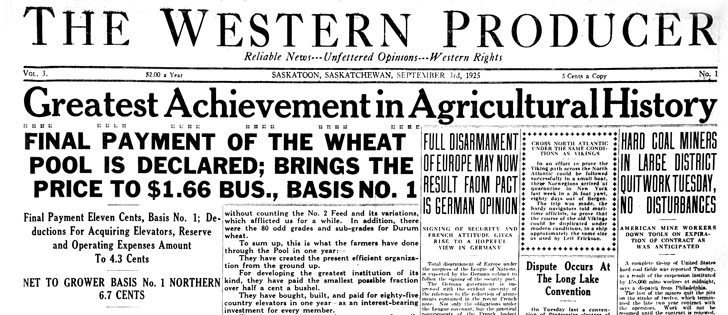A strong voice for women’s rights. Life was black and white for the second wave of suffragettes such as Agnes McPhail. | by karen morrison, saskatoon newsroom
NOW:
She could marry and raise a family or have a career advancing the cause of women, children and farmers in Canada. She chose the latter, aggressively rising through the ranks of the United Farmers of Ontario and becoming an MP and a member of the legislature in Ontario.
Terry Crowley, author of Agnes McPhail and the Politics of Equality, said the stubborn feminist with Scottish roots was the first significant female in the Canadian farm movement.
“She has certain heroic characteristics with a certain bloody mindedness,” he said.
Read Also

Agritechnica Day 3: Hybrid drive for a combine, data standards keep up to tech change and tractors of the year
Agritechnica 2025 Day 3: Hybrid drive for a combine, data standards keep up to tech change and tractors of the year.
McPhail moved into farm groups at a time when women were typically serving in women’s auxiliaries and institutes, he said.
“She just would not have any truck or trade with that sort of notion,” said Crowley.
“She would compete in the arena where males compete and make a difference thereby.”
Women’s contributions were marginalized and weaker than the men’s because of the roles assigned to these segregated organizations
“She broke that barrier,” said Crowley.
McPhail argued that women have as much dignity as men and derive as much benefit from work as men.
She was an early advocate of equal pay for work of equal value and fought to enhance women’s position on the farm, arguing for full equal roles or independent farmer status.
On the political front, she was elected to government on the heels of women winning the right to vote.
She was the first female MP in 1921 and the only one during her tenure.
Crowley said she provided a voice for the plight of women and children, such as her work helping negotiate pensions for the poor with Mackenzie King’s Liberal government.
However, Valerie Korinek, history professor at the University of Saskatchewan, said she was hindered by being in a reformist party and never being elected to government office. Despite that, she managed to advance the profile of farming and women’s roles in farm operations.
McPhail was part of a group that built on gains made by early suffragettes and women who joined the paid workforce during the war years.
“They were valued for their contribution to improving the lives of women and children but also to give women a voice to voice political concerns ultimately heard by the larger farm organization and movements,” Korinek said.
Crowley said McPhail’s earliest struggle was to convince her family to let her attend high school, which required a change in thinking for a family of modest means.
She began life on a small farm and was heavily influenced by her Scottish father, who was considered “a wit and a wag” who got on well with people.
McPhail went on to teach in rural Ontario and Alberta, hone her rhetorical skills and rise quickly through the United Farmer ranks.
Crowley said her’s was a tale of personal growth, dedication and forcefulness.
He and Korinek said she drew attention to many issues at home, including deplorable conditions in jails, the separation of young offenders from adult prisoners, the plight of miners in Cape Breton and the British treatment of the Chinese in Shanghai.
Korinek placed McPhail squarely among a tide of influential women, which included former Western Producer women’s editor Violet McNaughton, who made a difference and were symbols of what women could achieve.
“She contributed to that overall impression that women could achieve formal political participation,” she said.
“It goes to show how an individual with determination and desire to make a change can really make a change.”
A minister presiding over her funeral best summed up the many challenges she faced in her lifetime.
“Her life might have been much easier, but this was the path she chose, the craggy course.”
THEN: Drury lashes U.F.O from Liberal platform
Depicting the United Farmers of Ontario and Miss Agnes MacPhail, spokesman for the United Farmer candidate in the North Huron by-election, as chasing “the Will of the Wisp of group government in to a morass that will make the farmers of the province ridiculous, futile and lead to their destruction as a political force,” Ernest Charles Drury, former premier of Ontario, entered the North Huron campaign last week on behalf of Archie Hislop, Liberal candidate.
“Miss MacPhail says that all she wants is to change the system of government, and to introduce the group government system,” Mr. Drury observed, “but I would like to tell you that such a fine spun sovietized theory, because it is borrowed from the materialistic theory of history, sponsored by Marx, has been tried only in Soviet Russia, and to the distress of the people.
“Group government, which could not help but develop into government by bureaucracy, cannot come into Canada until Miss MacPhail’s following get power and obviously that is far off ….”














